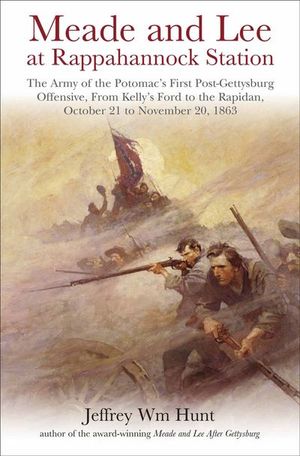Meade and Lee at Rappahannock Station
Published by Savas Beatie
The third installment of this award-winning Civil War series offers a vivid and authoritative chronicle of Meade and Lee’s conflict after Gettysburg.
The Eastern Theater of the Civil War during the late summer and fall of 1863 was anything but inconsequential. Generals George Meade and Robert E. Lee clashed in cavalry actions and pitched battles that proved that the war in Virginia was far decided at Gettysburg. Drawing on official reports, regimental histories, letters, newspapers, and other archival sources, Jeffrey Wm Hunt sheds much-needed light on this significant period in Meade and Lee at Rappahannock Station.
After Gettysburg, the Richmond War Department sent James Longstreet and two divisions from Lee’s army to reinforce Braxton Bragg’s Army of Tennessee. Washington followed suit by sending two of Meade’s corps to reinforce William Rosecrans’ Army of the Cumberland. Despite his weakened state, Lee launched a daring offensive that drove Meade back but ended in a bloody defeat at Bristoe Station on October 14th.
What happened next is the subject of Meade and Lee at Rappahannock Station, a fast-paced and dynamic account of Lee’s bold strategy to hold the Rappahannock River line. Hunt provides a day-by-day, and sometimes minute-by-minute, account of the Union army’s first post-Gettysburg offensive action and Lee’s efforts to repel it. In addition to politics, strategy, and tactics, Hunt examines the intricate command relationships, Lee’s questionable decision-making, and the courageous spirit of the fighting men.
The Eastern Theater of the Civil War during the late summer and fall of 1863 was anything but inconsequential. Generals George Meade and Robert E. Lee clashed in cavalry actions and pitched battles that proved that the war in Virginia was far decided at Gettysburg. Drawing on official reports, regimental histories, letters, newspapers, and other archival sources, Jeffrey Wm Hunt sheds much-needed light on this significant period in Meade and Lee at Rappahannock Station.
After Gettysburg, the Richmond War Department sent James Longstreet and two divisions from Lee’s army to reinforce Braxton Bragg’s Army of Tennessee. Washington followed suit by sending two of Meade’s corps to reinforce William Rosecrans’ Army of the Cumberland. Despite his weakened state, Lee launched a daring offensive that drove Meade back but ended in a bloody defeat at Bristoe Station on October 14th.
What happened next is the subject of Meade and Lee at Rappahannock Station, a fast-paced and dynamic account of Lee’s bold strategy to hold the Rappahannock River line. Hunt provides a day-by-day, and sometimes minute-by-minute, account of the Union army’s first post-Gettysburg offensive action and Lee’s efforts to repel it. In addition to politics, strategy, and tactics, Hunt examines the intricate command relationships, Lee’s questionable decision-making, and the courageous spirit of the fighting men.
BUY NOW FROM
COMMUNITY REVIEWS

